unit 7 helping at home 讲义
- 格式:docx
- 大小:179.63 KB
- 文档页数:4
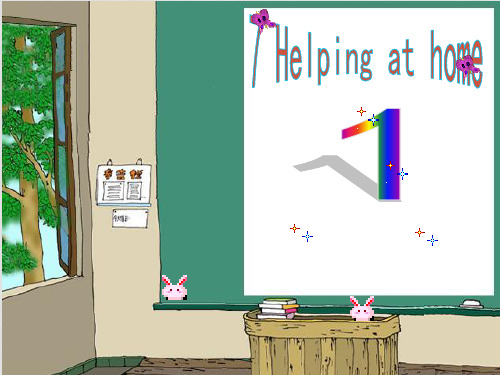
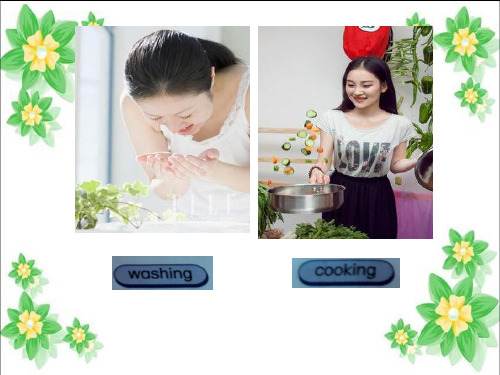
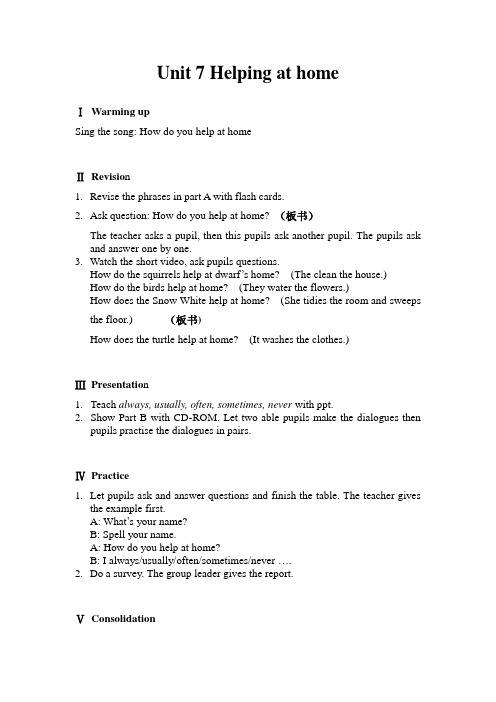
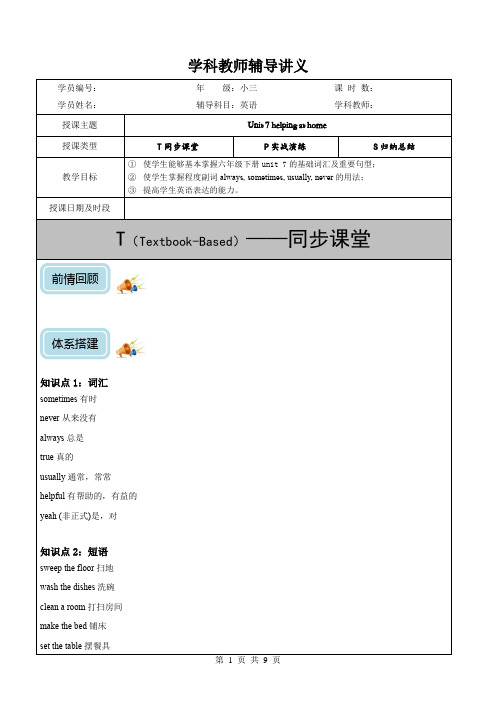
学科教师辅导讲义前情回顾体系搭建知识点1:词汇sometimes有时never从来没有always总是true真的usually通常,常常helpful有帮助的,有益的yeah(非正式)是,对知识点2:短语sweep the floor扫地wash the dishes洗碗clean a room打扫房间make the bed铺床set the table摆餐具help at home在家里帮忙water the plants给植物浇水知识点3:句型1. --What can your robot do?你的机器人会做什么。
--he can sweep the floor.他会扫地。
can “能,可以”can + 动词原形what can you do ?what can he do ?What can your robot do?He can2. --How do you help at home?你在家帮忙做什么?--I always water the plants.我总是给植物浇水。
--I usually make the bed.我常常铺床--I sometimes sweep the floor.有时我扫地。
--I never wash the dishes.我从来不洗碗。
How do you help at home?I always / usually / sometimes / never + 动词原形How do you help at home? How do you help at home?I usually I always3. --How does your dad help at home?你爸爸在家帮忙做什么?--He always washes the dishes.他总是洗碗。
--He usually makes the bed.有时他扫地。
--He sometimes sweeps the floor.有时他扫地。

四年级上英语教案Unit7 Helping at home (Part B2)广东开心版教学内容:本节课的教学内容为广东开心版四年级上册英语Unit7 Helping at home (Part B2)。
教学内容主要围绕家庭生活中的帮助行为展开,包括学习如何用英语表达家庭成员之间的帮助行为,以及学习相关的英语词汇和句型。
教学目标:1. 让学生掌握本节课的生词和短语,如“sweep the floor”、“wash the clothes”等;2. 让学生学会用英语描述家庭成员之间的帮助行为,如“I help my mother wash the dishes.”;3. 培养学生的听说能力和合作精神,提高学生的英语口语表达能力。
教学难点:1. 正确发音和记忆生词;2. 运用所学句型和词汇进行口语表达;3. 理解和运用本节课的重点句型。
教具学具准备:1. 教学课件;2. 生词卡片;3. 录音机及录音带;4. 家庭场景布置道具。
教学过程:1. 导入:通过图片或视频展示家庭成员之间的帮助行为,引导学生进入主题;2. 新课内容展示:讲解生词和短语,让学生跟读并模仿;3. 句型练习:通过师生互动、生生互动等方式,让学生练习本节课的重点句型;4. 角色扮演:学生分组进行角色扮演,模拟家庭成员之间的帮助行为;5. 小组讨论:让学生分组讨论家庭成员之间的帮助行为,并用英语进行分享;板书设计:1. Unit7 Helping at home (Part B2)2. 生词和短语:sweep the floor、wash the clothes等;3. 重点句型:I help my mother wash the dishes.作业设计:1.抄写本节课的生词和短语;2.根据本节课的重点句型,编写一段家庭成员之间帮助行为的对话;3.预习下一节课的内容。
课后反思:本节课通过生动的教学场景和丰富的教学活动,让学生在轻松愉快的氛围中学习英语。
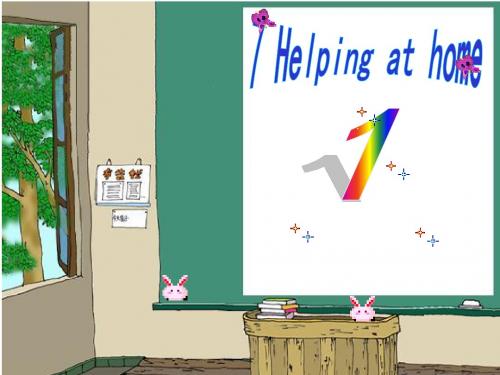
学科教师辅导讲义前情回忆体系搭建知识点1:词汇sometimes有时never从来没有always总是true真的usually通常,常常helpful有帮助的,有益的yeah(非正式)是,对知识点2:短语sweep the floor扫地wash the dishes洗碗clean a room清扫房间make the bed铺床set the table摆餐具help at home在家里帮助water the plants给植物浇水知识点3:句型1. --What can your robot do?你的机器人会做什么。
--he can sweep the floor.他会扫地。
can “能,可以〞can + 动词原形what can you do ?what can he do ?What can your robot do?He can2. --How do you help at home?你在家帮助做什么?--I always water the plants.我总是给植物浇水。
--I usually make the bed.我常常铺床--I sometimes sweep the floor.有时我扫地。
--I never wash the dishes.我从来不洗碗。
How do you help at home?I always / usually / sometimes / never + 动词原形How do you help at home? How do you help at home?I usually I always3. --How does your dad help at home?你爸爸在家帮助做什么?--He always washes the dishes.他总是洗碗。
--He usually makes the bed.有时他扫地。
--He sometimes sweeps the floor.有时他扫地。
常用频度副词及生活常用动词词组2014-4-26
第一次课
要点总结
1,生活常用动词词组sweep the floor、water the plants、wash the dishes、clean a room、set the table、make the bed、wash the clothes、cook the dinner、Look after baby。
小试牛刀之连连看
sweep the floor 摆好餐具
water the plants 洗衣服
wash the dishes 给植物浇水
clean a room 做饭
set the table 打扫房间
make the bed 扫地
wash the clothes 照顾小孩
cook the dinner 铺床
Look after baby 洗碗
2,how do you help at home?及how does he/she helps at home?的回答。
注意三人称单数要在动词后加s或es。
试试身手
A:How do you help at home?
B: I always help my mom (扫地).
A: How (do,does) your sister help at home?
B:She sometimes (洗碗)
3,常用频度副词always(总是、一直)、usually(通常)、often(经常)、sometimes(有时)、rarely(很少)、never(几乎不),表示某事在一段时间内发生的次数。
你会了吗?试试看吧
She is late for school. 她上学经常迟到
I help my mother in the house.有时候我帮助妈妈做家务。
课后一测
一,读短文,回答问题
判断对错
1.Peter is a girl. ( )
2.Peter washes the dishes. ( )
3.Peter sweeps the floor. ( )
4.Peter waters the plants. ( )
5.Peter does a little. ( )
选择正确答案填空
1.Peter is _____ at school.
A. a good boy
B. a good girl
2.A:How does Peter help at home?
B:_____________________.
A.washes the clothes,
B.sweeps the floor
dusts the furniture, dusts the furniture
folds the clothes waters the plants
3.A:How does Peter’s father help at home?
B:_____________________.
A.He helps Peter.
B.He washes the clothes.
填空
Jin Lu is a good girl at school. She waters the plants. She_______ the clothes and she ______ the room , too. And Tang Tao is a good boy at school , too. He sets the _______. He_______ the floor. He waters the _________,too.
二,根据中文意思填空
1, How you help at home? 你在家里是怎样帮忙的?
2, How your dad help at home? 你爸爸在家里是怎样帮忙的?
3, He always . (洗碗)
4, He usually . (摆好餐具)
5, I sometimes . (扫地)
6, She never . (给植物浇水 )
7, You never at home. (帮忙)
三,根据你的个人情况打钩
四, 选词填空
1. We can believe (相信) him because he is ________ honest. (always, never)
2. They ________ (never, usually)go out for a walk after supper but today they stay
at home.
3. Lily is a lazy girl. She ________ (sometimes, never) helps her mother with the housework.
4. He likes watching films very much so he ________ (never, often) goes to the cinema.
5. Peter is busy these days, so he ________ watches TV. (always, never)。